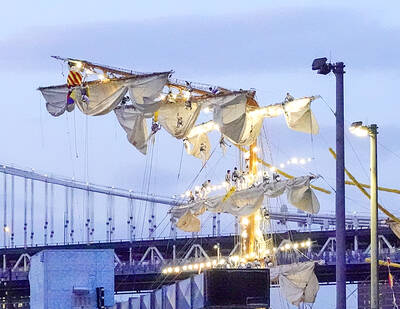The Russians are coming? No problem: just round up some fishing trawlers, give them some minesweeping gear and get cracking.
That was part of Britain’s 1978 plan to repel a possible Soviet invasion, according to newly declassified documents released yesterday by the National Archives.
“Heaven help us if there is a war,” was then British prime minister James Callaghan’s response when briefed on the decay of Britain’s once formidable defenses.
It was a time of growing Soviet belligerence, bolstered by a rising military budget and an impressive array of new weaponry.
At the same time, Britain’s defense program was stagnating in part because of a prolonged recession that checked defense expenditures.
The newly released documents show that Callaghan became worried after reading a secret Joint Intelligence Committee report detailing the superiority of Soviet arms at the height of the Cold War.
The consensus was gloomy: Britain could not effectively fight back alone against a Soviet attack, whether it was nuclear, conventional, or a feared combination of the two.
The British lacked fighter planes to combat Soviet bombers, missiles to strike down incoming nuclear warheads, even mine-clearing ships needed to keep waterways open — hence the plan to press trawlers into service.
Then Cabinet secretary John Hunt admitted that Britain’s defenses “are already less than they should desirably be” and that Soviet strength was expanding.
“The problem is made worse by the rate at which the offensive capability which the Russians might use against the United Kingdom is growing,” he wrote in an Aug. 1, 1978, memo to the prime minister. “We shall have to run hard to stand still.”
He goes on the describe much of the nation’s defense equipment as outmoded, rusting and obsolete.
After receiving the intelligence report late in 1977, Callaghan ordered an urgent review of military preparedness and demanded options for upgrading Britain’s defenses.
He was ultimately convinced, however, that it would be disruptive to shift Britain’s planes and other military assets from NATO patrols so they could be used to protect the UK. He decided instead to stick with NATO’s collective approach to keeping the Soviets out of Europe.
Callaghan seems swayed by his Cabinet’s consensus, expressed by Hunt on Aug. 1, 1978, that it would be counterproductive to focus on protecting Britain at the expense of NATO’s central front.
To do so would “weaken the political and military cohesion of the Alliance and thus its collective ability to deter the Soviet Union,” Hunt wrote. “If that happened, we should lose more than we should gain.”

BACKLASH: The National Party quit its decades-long partnership with the Liberal Party after their election loss to center-left Labor, which won a historic third term Australia’s National Party has split from its conservative coalition partner of more than 60 years, the Liberal Party, citing policy differences over renewable energy and after a resounding loss at a national election this month. “Its time to have a break,” Nationals leader David Littleproud told reporters yesterday. The split shows the pressure on Australia’s conservative parties after Prime Minister Anthony Albanese’s center-left Labor party won a historic second term in the May 3 election, powered by a voter backlash against US President Donald Trump’s policies. Under the long-standing partnership in state and federal politics, the Liberal and National coalition had shared power

A Croatian town has come up with a novel solution to solve the issue of working parents when there are no public childcare spaces available: pay grandparents to do it. Samobor, near the capital, Zagreb, has become the first in the country to run a “Grandmother-Grandfather Service,” which pays 360 euros (US$400) a month per child. The scheme allows grandparents to top up their pension, but the authorities also hope it will boost family ties and tackle social isolation as the population ages. “The benefits are multiple,” Samobor Mayor Petra Skrobot told reporters. “Pensions are rather low and for parents it is sometimes

CONTROVERSY: During the performance of Israel’s entrant Yuval Raphael’s song ‘New Day Will Rise,’ loud whistles were heard and two people tried to get on stage Austria’s JJ yesterday won the Eurovision Song Contest, with his operatic song Wasted Love triumphing at the world’s biggest live music television event. After votes from national juries around Europe and viewers from across the continent and beyond, JJ gave Austria its first victory since bearded drag performer Conchita Wurst’s 2014 triumph. After the nail-biting drama as the votes were revealed running into yesterday morning, Austria finished with 436 points, ahead of Israel — whose participation drew protests — on 357 and Estonia on 356. “Thank you to you, Europe, for making my dreams come true,” 24-year-old countertenor JJ, whose

Two people died and 19 others were injured after a Mexican Navy training ship hit the Brooklyn Bridge, New York City Mayor Eric Adams said yesterday. The ship snapped all three of its masts as it collided with the New York City landmark late on Saturday, while onlookers enjoying the balmy spring evening watched in horror. “At this time, of the 277 on board, 19 sustained injuries, 2 of which remain in critical condition, and 2 more have sadly passed away from their injuries,” Adams posted on X. Footage shared online showed the Mexican Navy ship Cuauhtemoc, its sails furled